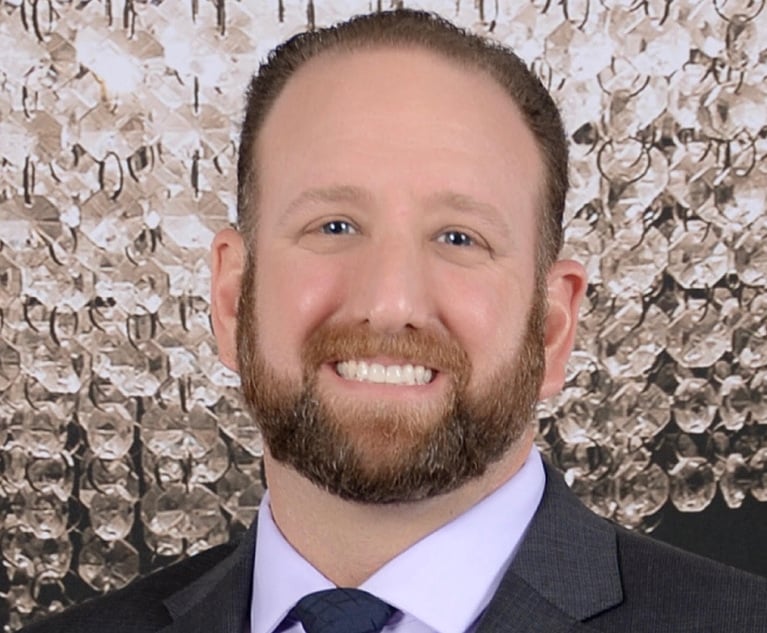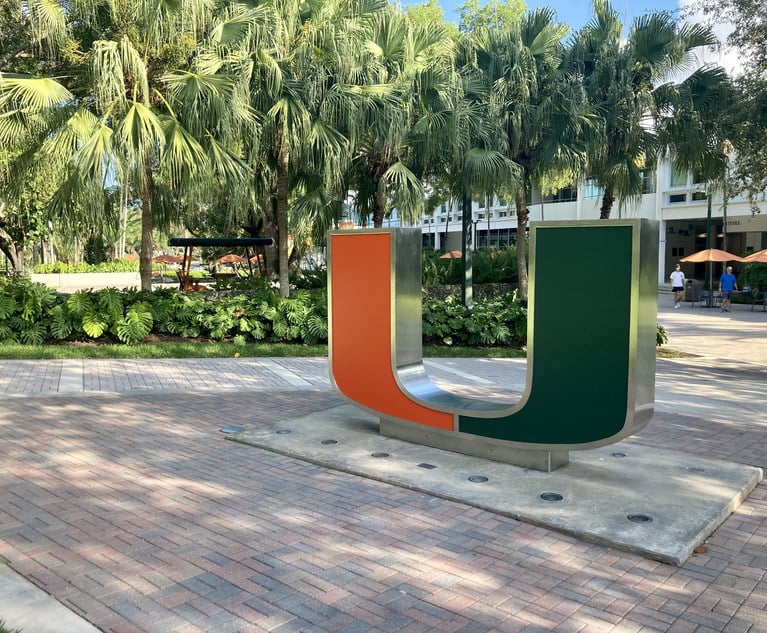 Biometric hand system. Photo: Shutterstock.
Biometric hand system. Photo: Shutterstock.'You Better Be Paying Attention': Attorneys Discuss Collision of Biometrics and Law
"Frankly, there will be a time when this is so common that it's going to be negligent not to use biometrics," said employment law attorney John "Jack" Lord of Foley & Lardner in Miami.
January 21, 2020 at 05:24 PM
8 minute read
Fear, religion, privacy, security, technology, productivity and potential corporate liability all intersect as companies opt for palm prints, microchips, geo-locators and other tools to track employees and products.
That's the perfect mix, litigators say, for exposing businesses to religious-discrimination claims and class actions under several laws, including The Americans with Disabilities Act.
Attorneys also note a new threat: the Genetic Information Nondiscrimination Act, a 2008 federal law mostly used in insurance litigation—until now, when it could potentially feature in employment litigation.
As the technology continues to develop, lawyers say one thing is clear: Biometrics are here to stay. They also note there's no federal law expressly prohibiting biometric authentication—driven by human-body measurements, behaviors and physical characteristics—but that states are passing legislation.
"Frankly, there will be a time when this is so common that it's going to be negligent not to use biometrics," said Miami labor and employment attorney John "Jack" Lord Jr. of Foley & Lardner, who said finger scans are already popular among his clients. "Maybe even in 20 years we're going to be at that stage."
|Thorny implementation
As it stands, employers can microchip employees—as long as staff consent to it, according to employment and personal injury attorney Jason Melton of Whittel & Melton in Spring Hill, Florida.
Companies, like Wisconsin's Three Square Market, have been rolling out the technology for years. In 2017, Three Square became the first U.S. to offer microchip implants for employees. It uses the devices to give staff access to its building, and allow secure sign-on to its computers and other electronic devices, including vending machines.
In other industries, like defense contracting, attorneys say microchips provide a safety measure that ID badges can't, helping to control access to prevent data breaches.
"I can understand the need for it," said Melton, who expects broader deployment. "In states like Florida, that can be just the way they run their business. … If you're not willing to cooperate, then I guess you're not a good fit for the business."
But implementation would be thorny, in Melton's view, as it protrudes into the gray area of "things that employers would like to know," but don't have the "right to force their employees to tell them about." On that list of information that might be disclosed: whether an employee is pregnant, gaining weight, becoming less active, drinking, smoking or taking drugs on the weekend.
 John "Jack" Lord Jr, partner at Foley & Lardner in Miami. Courtesy photo.
John "Jack" Lord Jr, partner at Foley & Lardner in Miami. Courtesy photo.
Plus, Lord sees privacy problems with microchipping employees because the measure could allow companies to track staff outside of the workplace.
"Yes, an employer can say, 'We're going to turn it off and not track you,' but come on," Lord said.
That said, Lord noted there are valid business reasons to allow tracking — something many companies already do through employees' phones.
"For a company like UPS, logistics matter. Tenths of seconds matter in certain industries," Lord said. "There are very good business reasons sometimes to track. If it's to create efficiency, 'OK, we're going to learn what route is best, and start using that one,' and also to prevent fraud and to encourage productivity."
Karen S. Elliott of Eckert Seamans Cherin & Mellott in Virginia said she's had about four clients call her about geolocation apps this year so they can track where their staff are when they clock in through their phones.
"And they're not large employers," Elliott said. "So we are seeing technology in the sense of employee monitoring from that standpoint increasing."
Though there is no federal law expressly blocking employers from tracking staff, Elliott said it's best practice to get informed consent.
|State law
Some states have created consumer and worker privacy laws they hope will address unknown implications from the emerging technology. Wisconsin, North Dakota, Oklahoma, Missouri and California have passed laws blocking mandatory implants of identification devices. While in 2008, Illinois became the first state to introduce a biometric privacy law governing the use and storage of biometric identifiers, including fingerprints, voiceprints, iris, retina, hand and face scans.
"If you have employees in Illinois, you better be paying attention to that specific law," Lord said.
Some companies have felt the fallout.
While Walt Disney Parks and Resorts Inc. now uses fingerprint scanning systems to authenticate visitors, Six Flags Entertainment Corp. in Illinois lost a lawsuit for using similar scans in its theme park. Facebook has also ran into legal trouble in the state over its photo tagging feature.
In states like Florida that lack a comparable law, Lord said litigators could still sue, bringing common law invasion-of-privacy claims. For employers, he recommends always obtaining consent before collecting and storing any data on staff's health or genetics — and thinking "long and hard" before considering selling it.
"Class actions in this area would be a real risk because obviously you're bound to get more than one claim," Lord said. "If you're doing it wrong, it's going to be across the board."
|Dormant no more
The Americans with Disabilities Act and the Genetic Information Nondiscrimination Act would come into play, as they govern the collection and use of medical and genetic information. Religious discrimination claims are also possible.
One Virginia mining worker won a more than $500,000 jury award against his employer after he allegedly felt forced to retire because he refused to use a biometric hand scanner. Backed by the U.S. Equal Employment Opportunity Commission, the man claimed the scanner discriminated against his Evangelical Christian beliefs, as he worried it could impart the "mark of the beast" referenced in the Bible. The U.S. Court of Appeals for the Fourth Circuit upheld the verdict in 2017.
The Genetic Information Nondiscrimination Act is commonly used in the insurance world, but Lord said it's rarely used against employers.
"That's a law that's kind of sitting dormant," Lord said. "But I could see that law becoming more popular and more necessary, or more used by employee-side attorneys in the future if these types of things happen."
|'Sky's the limit'
Elliott said she hasn't yet heard a client discuss microchipping their staff.
"I think there would be a visceral reaction from the employees if that were the case," Elliott said. "Unless it were more convenient for the employee than the employer, then maybe the employees might be OK with it."
 Jason M. Melton of Whittel & Melton, in Spring Hill, Florida. Courtesy photo.
Jason M. Melton of Whittel & Melton, in Spring Hill, Florida. Courtesy photo.
In Melton's view, it's difficult to judge how microchip and biometrics will change the legal landscape as it's nearly impossible to predict how technology will be used — and misused. In 2019, for example, a Washington Post probe revealed that police across the U.S. can download and permanently keep footage from Ring's doorbell cameras to use for investigating crimes like trespassing and burglary.
"Technology has moved our society at much greater speeds than the courts ever could," Melton said.
There is an advantage to waiting to pass laws, according to Lord, who said Florida could use a "well-crafted law" in this area are that balances employee and employer rights.
"Sometimes being the first, like California, can lead to unintended consequences, and the need for a lot of changes," Lord said. "So companies have to scramble, 'OK, we're doing it this way,' then, 'Oh, now you want it like this.' "
Elliott suspects biometrics could eventually be used instead of drug tests to more accurately detect whether employees are impaired at work — though the Equal Employment Opportunity Commission has expressed concern that could violate the ADA.
" We have some very old laws on our book that deal with our society when it was a manufacturing society, so Congress has been very slow to come in to the 21st century," Elliott said. "One of the things that some of these lawyers are propounding is that you do an agility test, to test on your best day if you can function certain ways. I don't know if we could get to a level that might test that biometrically, but the sky's the limit."
Read more:
This content has been archived. It is available through our partners, LexisNexis® and Bloomberg Law.
To view this content, please continue to their sites.
Not a Lexis Subscriber?
Subscribe Now
Not a Bloomberg Law Subscriber?
Subscribe Now
NOT FOR REPRINT
© 2024 ALM Global, LLC, All Rights Reserved. Request academic re-use from www.copyright.com. All other uses, submit a request to [email protected]. For more information visit Asset & Logo Licensing.
You Might Like
View All
'Get Rid of the Men': Employer Accused of Discrimination

Employee's Alleged Action Lands Marriott in Court for Defamation, Negligence

11th Circuit Rejects Former CSX Employee's Safety-Related Whistleblowing Claims

Judge Says University of Miami Should Face Discrimination Case by Ex-Department Chair
4 minute readTrending Stories
- 1Judge Denies Sean Combs Third Bail Bid, Citing Community Safety
- 2Republican FTC Commissioner: 'The Time for Rulemaking by the Biden-Harris FTC Is Over'
- 3NY Appellate Panel Cites Student's Disciplinary History While Sending Negligence Claim Against School District to Trial
- 4A Meta DIG and Its Nvidia Implications
- 5Deception or Coercion? California Supreme Court Grants Review in Jailhouse Confession Case
Who Got The Work
Michael G. Bongiorno, Andrew Scott Dulberg and Elizabeth E. Driscoll from Wilmer Cutler Pickering Hale and Dorr have stepped in to represent Symbotic Inc., an A.I.-enabled technology platform that focuses on increasing supply chain efficiency, and other defendants in a pending shareholder derivative lawsuit. The case, filed Oct. 2 in Massachusetts District Court by the Brown Law Firm on behalf of Stephen Austen, accuses certain officers and directors of misleading investors in regard to Symbotic's potential for margin growth by failing to disclose that the company was not equipped to timely deploy its systems or manage expenses through project delays. The case, assigned to U.S. District Judge Nathaniel M. Gorton, is 1:24-cv-12522, Austen v. Cohen et al.
Who Got The Work
Edmund Polubinski and Marie Killmond of Davis Polk & Wardwell have entered appearances for data platform software development company MongoDB and other defendants in a pending shareholder derivative lawsuit. The action, filed Oct. 7 in New York Southern District Court by the Brown Law Firm, accuses the company's directors and/or officers of falsely expressing confidence in the company’s restructuring of its sales incentive plan and downplaying the severity of decreases in its upfront commitments. The case is 1:24-cv-07594, Roy v. Ittycheria et al.
Who Got The Work
Amy O. Bruchs and Kurt F. Ellison of Michael Best & Friedrich have entered appearances for Epic Systems Corp. in a pending employment discrimination lawsuit. The suit was filed Sept. 7 in Wisconsin Western District Court by Levine Eisberner LLC and Siri & Glimstad on behalf of a project manager who claims that he was wrongfully terminated after applying for a religious exemption to the defendant's COVID-19 vaccine mandate. The case, assigned to U.S. Magistrate Judge Anita Marie Boor, is 3:24-cv-00630, Secker, Nathan v. Epic Systems Corporation.
Who Got The Work
David X. Sullivan, Thomas J. Finn and Gregory A. Hall from McCarter & English have entered appearances for Sunrun Installation Services in a pending civil rights lawsuit. The complaint was filed Sept. 4 in Connecticut District Court by attorney Robert M. Berke on behalf of former employee George Edward Steins, who was arrested and charged with employing an unregistered home improvement salesperson. The complaint alleges that had Sunrun informed the Connecticut Department of Consumer Protection that the plaintiff's employment had ended in 2017 and that he no longer held Sunrun's home improvement contractor license, he would not have been hit with charges, which were dismissed in May 2024. The case, assigned to U.S. District Judge Jeffrey A. Meyer, is 3:24-cv-01423, Steins v. Sunrun, Inc. et al.
Who Got The Work
Greenberg Traurig shareholder Joshua L. Raskin has entered an appearance for boohoo.com UK Ltd. in a pending patent infringement lawsuit. The suit, filed Sept. 3 in Texas Eastern District Court by Rozier Hardt McDonough on behalf of Alto Dynamics, asserts five patents related to an online shopping platform. The case, assigned to U.S. District Judge Rodney Gilstrap, is 2:24-cv-00719, Alto Dynamics, LLC v. boohoo.com UK Limited.
Featured Firms
Law Offices of Gary Martin Hays & Associates, P.C.
(470) 294-1674
Law Offices of Mark E. Salomone
(857) 444-6468
Smith & Hassler
(713) 739-1250






